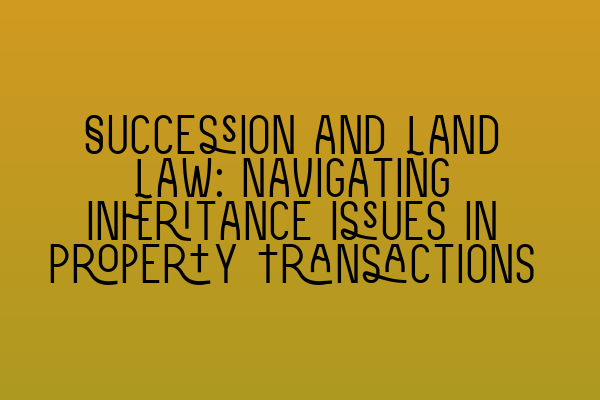Succession and Land Law: Navigating Inheritance Issues in Property Transactions
When it comes to property transactions, there are many legal considerations that need to be taken into account. One such consideration is the issue of succession and how it affects the transfer of property ownership. In this blog post, we will explore succession and land law, and provide guidance on how to navigate inheritance issues in property transactions.
Succession refers to the process by which property is transferred from one owner to another upon their death. In the context of land law, succession can have a significant impact on property transactions, particularly when it comes to determining who has the legal right to own and occupy the property.
One of the key factors in determining succession rights is whether the deceased owner left a will. A will is a legal document that outlines the deceased person’s wishes regarding the distribution of their assets, including any property they own. If a valid will exists, it will typically govern the transfer of property ownership and dictate who inherits the property.
However, if the deceased owner did not leave a will, their property will be governed by the laws of intestacy. Intestacy laws vary depending on the jurisdiction, but they generally provide a formula for distributing the deceased person’s assets among their closest relatives. In the absence of a will, the property may be inherited by the deceased person’s spouse, children, parents, or other close relatives.
When dealing with succession and land law in property transactions, it is important to ensure that the proper legal procedures are followed. This includes obtaining the necessary documentation and ensuring that all relevant parties are involved in the process. Failure to comply with these procedures can lead to legal disputes and complications down the line.
Additionally, it is important to consider any potential tax implications when dealing with inheritance issues in property transactions. In some cases, the transfer of property ownership may trigger capital gains tax or inheritance tax liabilities. It is advisable to consult with a tax expert or solicitor to ensure that all tax obligations are met and that the transaction is structured in the most tax-efficient manner.
At SQE Property Law & Land Law, our team of solicitors are well-versed in the intricacies of succession and land law. We can provide expert guidance and assistance in navigating inheritance issues in property transactions. Our goal is to ensure a smooth and seamless transfer of property ownership, while also protecting your rights and interests.
If you are planning to buy or sell a property, it is important to consider any potential succession issues and consult with a qualified solicitor. They can review your situation, provide tailored advice, and ensure that all legal requirements are met. By addressing succession issues proactively, you can avoid potential disputes and ensure a successful property transaction.
For more information on succession and land law, or to discuss your specific property transaction, please contact us today. Our team of dedicated solicitors are here to help.
Related Articles:
